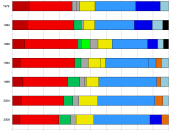Over the course of history, Europe has been ravaged by wars and conflicts, largely over religious and/or ethnic differences. The last great war involving virtually all of Europe: World War II, led to the creation of what we now know as the European Union. Currently there are 27 countries in the E.U., including notables such as England, Germany, France, Italy, and Spain. The E.U. has both positives and negatives, and overall the positives outweigh the negatives, thus dismissing the notion that representation in the EU threatens its future of freedom.
First, letÃÂs take a look at the positives. As we know, the purpose of democratic government is that it is supposed to be for the people. The implementation of the E.U. creates many benefits for its citizens. Citizens can work and live in any E.U. country they desire, as most E.U. countries have lessened the restrictiveness of their borders.
This allows people to move freely and goods to be easily accessible all throughout Europe. This cosmopolitan ideology encourages individual freedom, which encourages freedom amongst its whole.
But it is not all positive. The E.U. has opened up some rough spots. The main issue is the balance of power between the E.U. and its member states. This is especially true in England, where roughly 20% of the people are against the E.U. The reason why is because they feel control over major issues such as economic development, social programs, and crime laws should be left to the individual states. The problem lies in the fact that there are three branches of the E.U.(similar to that of the U.S.A.), but only one of those branches, the European Parliament, is directly composed of officials elected by E.U. citizens. The other two branches; the European Commission and the Council...


